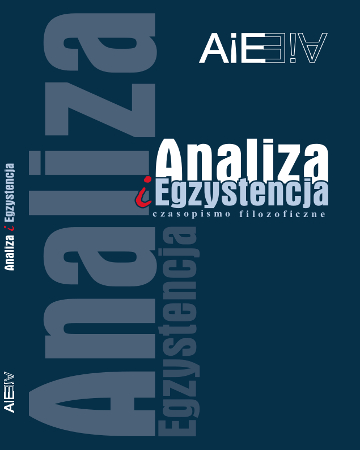
ISSN: 1734-9923
eISSN: 2300-7621
OAI
DOI: 10.18276/aie.2015.31-04






Lista wydań /
31 (2015)
Bycie czy byt? O dwóch podstawowych terminach filozofii Heideggera i problemach z ich polskimi przekładami
| Autorzy: |
Daniel Roland
Sobota
Uniwersytet Technologiczno-Przyrodniczy w Bydgoszczy |
| Słowa kluczowe: | Martin Heidegger, bycie, byt, das Sein, das Seiende, tłumaczenie |
| Data publikacji całości: | 2015 |
| Liczba stron: | 32 (65-96) |
Abstrakt
Martin Heidegger’s texts are among the most difficult in the philosophical literature throughout the world. Paradoxically, despite they are commonly considered as untranslatable, they belong to the most frequently translated twentieth-century philosophical texts. High availability of translations makes the thought of Heidegger still enjoy great interest and result in a number of comments. The constantly growing number of translations of his texts affects shapes of national philosophies and their issues. It is particularly clearly visible in Poland where for a long time the philosophy of Heidegger was available only to the narrow circle of the German-speaking philosophers. The situation has changed significantly since the early nineties, when there rapidly began to appear translations of his major works. However, a different problem occurred – namely the problem of translation. It is nowhere so much invisible as in the case of two basic words: bycie (Being) and byt (being). This text follows various ways of translating and interpreting of Heidegger’s terms, asking about their philosophical relevance and relationship to the established philosophical tradition. Not denying any previous choices, it tries to develop a relevant criterion for understanding the two concepts. In order to do this, it tries to reveal the most important idea of Heidegger’s philosophy.
Pobierz plik
Plik artykułu
Bibliografia
| 1. | Baran B. (1988), Saga Heideggera, Kraków: PAT. |
| 2. | Gethmann C.F. (1974), Verstehen und Auslegung. Das Methodenproblem in der Philosophie Martin Heideggers, Bonn: Bouvier Verlag Herbert Grundmann. |
| 3. | Gilson E. (1963), Byt i istota, tłum. P. Lubicz, J. Nowak, Warszawa: IW PAX. |
| 4. | Heidegger M. (1975), Gesamtausgabe, II. Abteilung: Vorlesungen 1923–1944, Bd. 24: Die Grundprobleme der Phänomenologie, hrsg. F.W. von Herrmann, Frankfurt am Main: Verlag von Vittorio Klostermann. |
| 5. | Heidegger M. (1977), Budować, mieszkać, myśleć. Eseje wybrane, Warszawa: Czytelnik. |
| 6. | Heidegger M. (1978), Gesamtausgabe, I. Abteilung: Veröffentliche Schriften 1914–1970, Bd. 1: Frühe Schriften, Frankfurt am Main: Vittorio Klostermann. |
| 7. | Heidegger M. (1989), Kant a problem meta zyki, tłum. B. Baran, Warszawa: PWN. |
| 8. | Heidegger M. (1990), Gesamtausgabe, II. Abteilung: Vorlesungen 1923–1944, Bd. 26: Metaphysische Anfangsgründe der Logik im Ausgang von Leibniz, hrsg. K. Held, Frankfurt am Main: Vittorio Klostermann Verlag. |
| 9. | Heidegger M. (1990), Samougruntowanie się niemieckiego uniwersytetu, tłum. J. Garewicz, [w:] Heidegger dzisiaj, „Principia” 1 (4). |
| 10. | Heidegger M. (1992), Gesamtausgabe, II. Abteilung: Vorlesungen 1919–1944, Bd. 19: Platon: Sophistes, hrsg. I. Schüssler, Frankfurt am Main: Vittorio Klostermann Verlag. |
| 11. | Heidegger M. (1994), Bycie i czas, tłum. B. Baran, Warszawa: Wydawnictwo Naukowe PWN. |
| 12. | Heidegger M. (1995), Gesamtausgabe, II. Abteilung: Vorlesungen 1923–1944, Bd. 25: Phänomenologische Interpretation von Kants Kritik der reinen Ver- nunft, Frankfurt am Main: Vittorio Klostermann Verlag. |
| 13. | Heidegger M. (1996), Przyczynki do lozo i (Z wydarzania), tłum. B. Baran, J. Mizera, Kraków: Wydawnictwo Baran i Suszczyński. |
| 14. | Heidegger M. (1998–1999), Nietzsche, tłum. A. Gniazdowski, P. Graczyk, W. Rymkiewicz, M. Werner, C. Wodziński, t. 1–2, Warszawa: Wydawnictwo Naukowe PWN. |
| 15. | Heidegger M. (1999), Ku rzeczy myślenia, tłum. K. Michalski, J. Mizera, C. Wo- dziński, Warszawa: Aletheia. |
| 16. | Heidegger M. (1999), Znaki drogi, tłum. różni, Warszawa: Spacja. |
| 17. | Heidegger M. (2000), Co zwie się myśleniem?, tłum. J. Mizera, Warszawa–Wrocław: PWN. |
| 18. | Heidegger M. (2000), Wprowadzenie do meta zyki, tłum. R. Marszałek, Warszawa: KR. |
| 19. | Heidegger M. (2006), Sein und Zeit, Tübingen: Max Niemeyer Verlag. |
| 20. | Heidegger M. (2009), Podstawowe problemy fenomenologii, tłum. B. Baran, Warszawa: Aletheia. |
| 21. | Lask E. (2003), Sämtliche Werke, Bd. II: Die Logik der Philosophie. Die Lehre vom Urteil, Jena: Dietrich Scheglmann Reprintverlag. |
| 22. | Michalski K. (1974), Martin Heidegger: Pisma wczesne, „Studia Filozo czne” nr 1. Mizera J. (2013), Uwagi o recepcji i przekładzie tekstów Martina Heideggera |
| 23. | w Polsce, „Argument”, vol. 3 (2), s. 245–252. |
| 24. | Müller M. (1964), Existenzphilosophie im geistigen Leben der Gegenwart, Heidelberg. |
| 25. | Przyłębski A. (1993), W poszukiwaniu królestwa lozo i. Z dziejów neokantyzmu badeńskiego, Poznań: Wydawnictwo UAM. |
| 26. | Rymkiewicz W. (2002), Ktoś i nikt. Wprowadzenie do lektury Heideggera, Wrocław: Wydawnictwo Uniwersytetu Wrocławskiego. |
| 27. | Sobota D.R. (2012), Źródła i inspiracje Heideggerowskiego pytania o bycie, t. 1: Neokantyzm i fenomenologia, Bydgoszcz: Fundacja Yakiza. |
| 28. | Sikora P. (2007), Perspektywy lozo i Istnienia. Hegel – Heidegger, Toruń: Wydawnictwo Adam Marszałek. |
| 29. | Tomasz z Akwinu (2009), Byt i istota, tłum. W. Seńko, Kęty: Wydawnictwo Marek Derewiecki. |
| 30. | Tugendhat E. (1999), Bycie. Prawda. Rozprawy lozo czne, tłum. J. Sidorek, War- szawa: Oficyna Naukowa. |
| 31. | Wisser R. (hrsg.) (1970), Martin Heidegger im Gespräch, München: Alber. |
| 32. | Żychliński A. (2006), Unterwegs zu einem Denker. Eine Studie zur Übersetzbarkeit dichterischer Philosophie am Beispiel der polnischen Übersetzung von Martin Heidegger „Sein und Zeit”, Wrocław–Dresden: Neisse Verlag. |